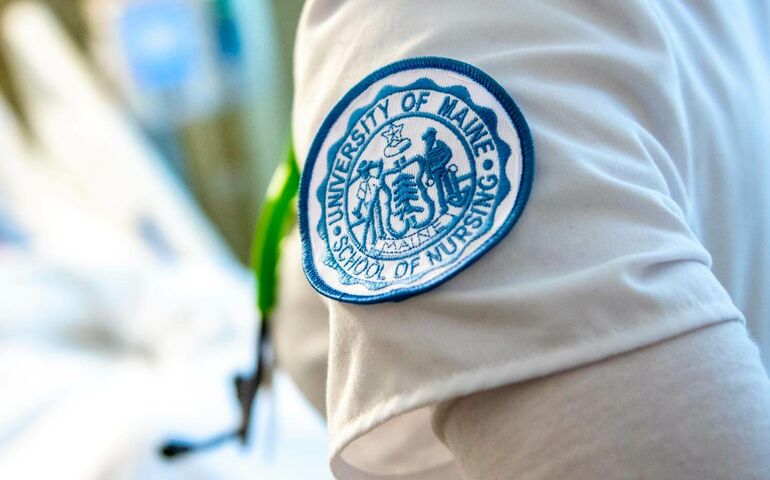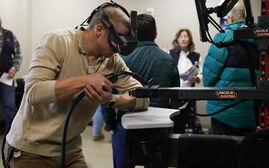UMaine School of Nursing receives $1.7M grant to help diversify Maine workforce
 Courtesy / University of Maine
A four-year $1.7 million federal grant is expected to help increase nursing education opportunities for individuals from financially disadvantaged and underrepresented ethnic and racial minorities in Maine.
Courtesy / University of Maine
A four-year $1.7 million federal grant is expected to help increase nursing education opportunities for individuals from financially disadvantaged and underrepresented ethnic and racial minorities in Maine.
Increasing the diversity of Maine’s workforce in nursing is the focus of a more than $1.7 million grant from the federal Health Resources and Services Administration to the University of Maine School of Nursing, in partnership with Northern Light Health and Morgan State University in Maryland.
The four-year award will help increase nursing education opportunities for individuals who are financially disadvantaged or from ethnic and racial minorities in Maine and, ultimately, help address the state’s shortage of nurses, according to a news release.
The Health Resources and Services Administration is an agency of the U.S. Department of Health and Human Services.
A priority of the initiative, called “Promoting Diversity in Nursing Education,” is to capitalize on the social, cultural and ethnic resources for in-state student diversity, Kelley Strout, director of the School of Nursing and principal investigator on the initiative, said in the release.
The initiative will include first-generation college students.
Targeted student recruitment in Maine will help ensure that graduating nurses join and remain a part of communities where their skills are most needed, Strout said. Increasing diversity of both students and faculty in the School of Nursing will prepare graduates to meet workforce needs fully.
The initiative’s goals align with the mission of the UMaine President’s Council on Diversity, Equity and Inclusion.
Strategic recruitment
The School of Nursing offers one of the university’s most sought-after degree programs, receiving upward of 1,400 applications for approximately 80 seats available in the fall semesters of the past five years. Nearly half of UMaine nursing students have been from out of state, and many do not remain in Maine after graduation.
“Place-bound and place-invested nurses are essential to meet the long-term needs of Maine,” Strout said. “Strategic recruitment campaigns will help identify the students best positioned to thrive in the nursing profession and will add to the state’s workforce diversity.”
The nursing workforce diversity initiative has three goals: increase access to nursing education for racial and ethnic minority and first-generation students; support the academic and professional success of racial and ethnic minority and first-generation nursing students in the bachelor’s degree program, and increase exposure and representation of racial minorities among the School of Nursing faculty.
‘Holistic’ admissions
Among the objectives in the first year of the grant, the School of Nursing will develop new, "holistic" admission criteria with the assistance of the American Association of Colleges of Nursing. The goal is to reform the school’s current narrow admissions criteria that are now based on two quantitative academic measures — high school grade point averages and SAT scores — and to be more inclusive and reflective of other work experience.
A new UMaine nursing student success coordinator will focus on student recruitment, retention and graduation as part of the holistic approach.
Diversity, equity, inclusion
UMaine faculty in nursing also will tap the health care-focused diversity, equity and inclusion resources of Northern Light Health. Last fall, Northern Light established a Diversity, Equity, and Inclusion Advisory Council, directed by Marwa Hassanien. Its DEI curriculum for Northern Light staff includes those at Eastern Maine Medical Center, the primary clinical training site for the School of Nursing.
The initiative serves two essential purposes, said Catharine MacLaren, vice president of talent and diversity at Northern Light Health.
“First, it will help increase the diversity of our workforce, which can be challenging in a fairly homogeneous state like Maine,” she said. “Second, it will complement some of Northern Light Health’s innovative work to recruit and retain nurses.”
Faculty exchange
A faculty exchange program with Morgan State University, Maryland’s preeminent public urban research university, and the state’s largest historically Black college and university, will be a critical resource in the development of curricula and program activities that are receptive to the social determinants that often impede access to education and academic success of students from diverse, disadvantaged backgrounds.
Morgan State will focus initially on how best to support high-risk students, creating — in partnership with UMaine and Northern Light Heath — training and learning opportunities for faculty. The long-term goal is to have semester-long faculty exchanges between the UMaine School of Nursing and the nursing program in Morgan State’s School of Community Health and Policy.
Maija Anderson, director of nursing at Morgan State University, said the grant offers Morgan the resources “to develop opportunities of mutual benefit, to include short- and medium-term exchanges for faculty teaching across the nursing curriculum, as well as advance workforce diversity in the nursing profession.”













0 Comments